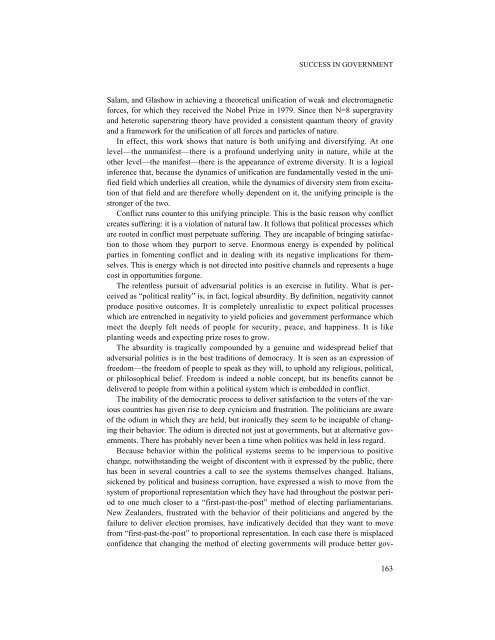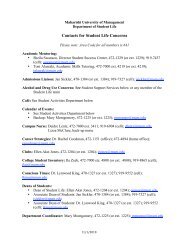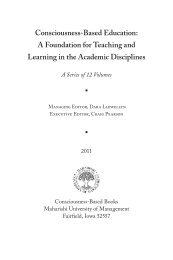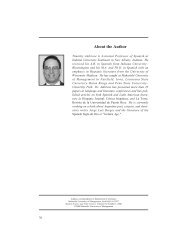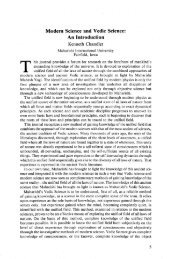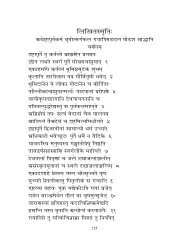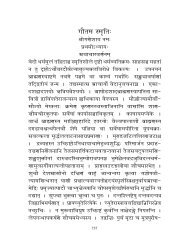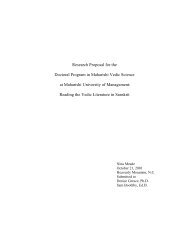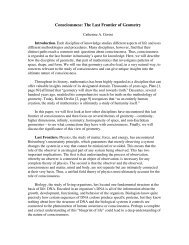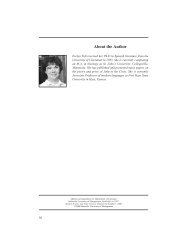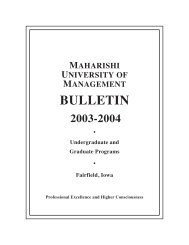Success in Government - Maharishi University of Management
Success in Government - Maharishi University of Management
Success in Government - Maharishi University of Management
Create successful ePaper yourself
Turn your PDF publications into a flip-book with our unique Google optimized e-Paper software.
SUCCESS IN GOVERNMENT<br />
Salam, and Glashow <strong>in</strong> achiev<strong>in</strong>g a theoretical unification <strong>of</strong> weak and electromagnetic<br />
forces, for which they received the Nobel Prize <strong>in</strong> 1979. S<strong>in</strong>ce then N=8 supergravity<br />
and heterotic superstr<strong>in</strong>g theory have provided a consistent quantum theory <strong>of</strong> gravity<br />
and a framework for the unification <strong>of</strong> all forces and particles <strong>of</strong> nature.<br />
In effect, this work shows that nature is both unify<strong>in</strong>g and diversify<strong>in</strong>g. At one<br />
level—the unmanifest—there is a pr<strong>of</strong>ound underly<strong>in</strong>g unity <strong>in</strong> nature, while at the<br />
other level—the manifest—there is the appearance <strong>of</strong> extreme diversity. It is a logical<br />
<strong>in</strong>ference that, because the dynamics <strong>of</strong> unification are fundamentally vested <strong>in</strong> the unified<br />
field which underlies all creation, while the dynamics <strong>of</strong> diversity stem from excitation<br />
<strong>of</strong> that field and are therefore wholly dependent on it, the unify<strong>in</strong>g pr<strong>in</strong>ciple is the<br />
stronger <strong>of</strong> the two.<br />
Conflict runs counter to this unify<strong>in</strong>g pr<strong>in</strong>ciple. This is the basic reason why conflict<br />
creates suffer<strong>in</strong>g: it is a violation <strong>of</strong> natural law. It follows that political processes which<br />
are rooted <strong>in</strong> conflict must perpetuate suffer<strong>in</strong>g. They are <strong>in</strong>capable <strong>of</strong> br<strong>in</strong>g<strong>in</strong>g satisfaction<br />
to those whom they purport to serve. Enormous energy is expended by political<br />
parties <strong>in</strong> foment<strong>in</strong>g conflict and <strong>in</strong> deal<strong>in</strong>g with its negative implications for themselves.<br />
This is energy which is not directed <strong>in</strong>to positive channels and represents a huge<br />
cost <strong>in</strong> opportunities forgone.<br />
The relentless pursuit <strong>of</strong> adversarial politics is an exercise <strong>in</strong> futility. What is perceived<br />
as “political reality” is, <strong>in</strong> fact, logical absurdity. By def<strong>in</strong>ition, negativity cannot<br />
produce positive outcomes. It is completely unrealistic to expect political processes<br />
which are entrenched <strong>in</strong> negativity to yield policies and government performance which<br />
meet the deeply felt needs <strong>of</strong> people for security, peace, and happ<strong>in</strong>ess. It is like<br />
plant<strong>in</strong>g weeds and expect<strong>in</strong>g prize roses to grow.<br />
The absurdity is tragically compounded by a genu<strong>in</strong>e and widespread belief that<br />
adversarial politics is <strong>in</strong> the best traditions <strong>of</strong> democracy. It is seen as an expression <strong>of</strong><br />
freedom—the freedom <strong>of</strong> people to speak as they will, to uphold any religious, political,<br />
or philosophical belief. Freedom is <strong>in</strong>deed a noble concept, but its benefits cannot be<br />
delivered to people from with<strong>in</strong> a political system which is embedded <strong>in</strong> conflict.<br />
The <strong>in</strong>ability <strong>of</strong> the democratic process to deliver satisfaction to the voters <strong>of</strong> the various<br />
countries has given rise to deep cynicism and frustration. The politicians are aware<br />
<strong>of</strong> the odium <strong>in</strong> which they are held, but ironically they seem to be <strong>in</strong>capable <strong>of</strong> chang<strong>in</strong>g<br />
their behavior. The odium is directed not just at governments, but at alternative governments.<br />
There has probably never been a time when politics was held <strong>in</strong> less regard.<br />
Because behavior with<strong>in</strong> the political systems seems to be impervious to positive<br />
change, notwithstand<strong>in</strong>g the weight <strong>of</strong> discontent with it expressed by the public, there<br />
has been <strong>in</strong> several countries a call to see the systems themselves changed. Italians,<br />
sickened by political and bus<strong>in</strong>ess corruption, have expressed a wish to move from the<br />
system <strong>of</strong> proportional representation which they have had throughout the postwar period<br />
to one much closer to a “first-past-the-post” method <strong>of</strong> elect<strong>in</strong>g parliamentarians.<br />
New Zealanders, frustrated with the behavior <strong>of</strong> their politicians and angered by the<br />
failure to deliver election promises, have <strong>in</strong>dicatively decided that they want to move<br />
from “first-past-the-post” to proportional representation. In each case there is misplaced<br />
confidence that chang<strong>in</strong>g the method <strong>of</strong> elect<strong>in</strong>g governments will produce better gov-<br />
163


